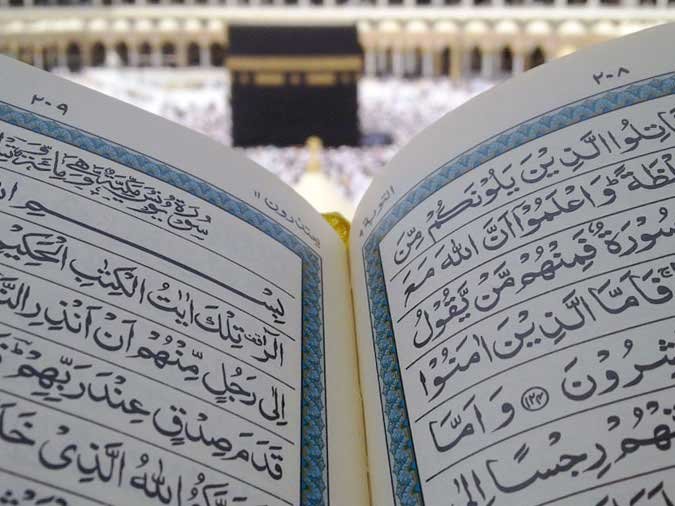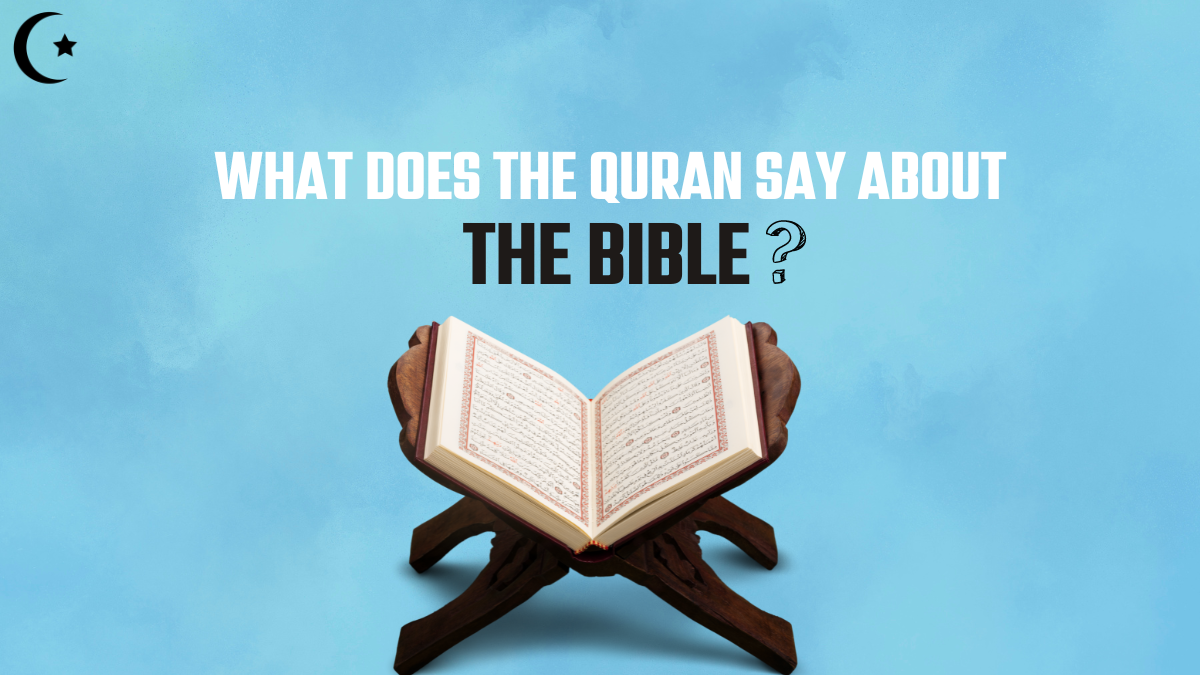Have you ever thought about the Quran’s view on the Bible? The way the Quran sees the Bible is fascinating. It shows how different faiths can respect and learn from each other. We’ll look into how the Quran talks about the Injil, Taurat, and Zabur, and what it says about the Bible.
This article will show you the Quran’s take on these important texts. We’ll dive into specific verses and ideas. You’ll see how the Quran sees the Bible and its place in Islamic beliefs. Well, what does the Quran say about the bible? Let’s find out.

Understanding the Quran’s View on Holy Books
The Quran sees itself as the final word in divine guidance. It honors the Torah, Psalms, and Gospel, seeing them as revelations from God for other communities. This Quranic view teaches us to value the wisdom in these texts, which fits with Islamic teachings.
Many verses in the Quran talk about the value of knowing about earlier divine messages. Surah 10:94 tells believers to learn from those who know the old Scriptures. Surah 5:68-69 also stresses the importance of understanding the Torah and the Gospel as key parts of God’s message.
The Quran mentions important biblical figures like Adam, Noah, and Jesus, showing they were prophets. This underlines a shared message across all revelations. Even though it says the Quran is the final guide for Muslims, it respects the earlier scriptures for their wisdom.
Some might think that old texts are lost forever, but the Quran suggests they still exist in some way. It notes that changes might have been made to these writings over time. This shows the Quran’s deep connection with these Holy Books.
The Bible in Islamic Tradition
The Bible is very important in Islamic tradition. It’s known as the “People of the Book.” This includes Jews and Christians, who have scriptures from God. The Quran mentions stories and characters from the Bible, showing how these faiths are connected.
About 25 percent of the Quran talks about stories and people from Jewish and Christian traditions. This shows a deep connection and sharing of ideas. Many themes and stories in the Quran are similar to those in the Bible.
The Quran talks about over fifty people and events from the Bible. It focuses on their moral and spiritual lessons, not just their history. This shows how important understanding the Bible is for its readers.
The Quran uses storytelling and literary styles similar to the Bible. This shows a deep connection with these traditions. It makes the Islamic tradition richer.
The Quran also talks to the Arabic versions of the Bible. It shows how God created Adam in both the Quran and the Bible. This story is very important in both faiths.
Stories like Cain and Abel have a special meaning in the Quran. They show a different view, unlike the Bible. The Quran is careful to respect the original scriptures of the People of the Book.
What Does The Quran Say About The Bible
The Quran gives a deep look at the importance of old holy texts, like the Bible. It sees the Taurat, Injil, and Zabur as key parts of divine guidance. These texts show how God’s message has been given to people over time.
The Quran sees itself as the final part of this divine message. It shows the value of the revelations before it.
Verses Referencing the Bible
Many Quranic verses talk about the Bible and its parts. For example, Surah 5:43-46 talks about the Taurat as God’s command. It’s a guide and light for the Children of Israel.
Surah 5:46 also talks about the Injil. It says it confirms the Taurat and guides those who listen to it. These verses show the Quran’s respect for these holy texts.
Terms Used for Biblical Texts
The Quran uses special words for different scriptures. ‘Taurat’ means the Torah, given to Moses. ‘Zabur’ means the Psalms, given to David. ‘Injil’ means the Gospel, given to Jesus.
By using these terms, the Quran shows it knows the unique roles of these texts in religious history.
The Taurat (Torah) and Its Significance
The Taurat, also known as the Torah, is very important in Islamic teachings. The Quran says it was given to Moses by God. It gives guidance to the Children of Israel.
This book has rules that help people live morally and ethically. The Quran talks about the Taurat a lot, showing its value. It’s mentioned 18 times, highlighting its role in sharing God’s will.
Revelation to Moses
Moses is a key figure in the Quran, mentioned 136 times. He is seen as a prophet who received the Taurat from God. Many prophets, including Harun, followed its rules.
This book is full of wisdom and guidance. It helps believers on their spiritual path.
The Purpose of the Torah
The Taurat is more than just laws. It’s a guide for living right and being spiritually aware. The Quran says it’s important for following God’s rules and finding one’s spiritual path.
It talks about justice and being morally responsible. The Quran also says the Taurat tells us about the Last Day and what comes after life. This makes it key for believers to live as God wants.
The Zabur (Psalms) in the Quran
The Zabur, also known as the Psalms, is a key part of Islamic scripture. The Quran says it was given to Prophet Dawud (David) by God. It shows how important these texts are for guiding believers.
References in the Quran highlight the Zabur’s poetic and prophetic nature. This underlines its role as a source of spiritual wisdom.
References to David’s Psalms
The Quran talks about the Zabur three times, showing its value alongside other holy books. A key verse in Quran 21:105 talks about righteous inheritance: “My righteous servants shall inherit the earth.” This verse shows the lasting message of justice and hope in the Psalms.
Interpretation of Zabur in Islam
In Islam, the Zabur is seen as a crucial text, offering guidance similar to the Quran. Prophet Dawud recited his Psalms with such beauty that even nature responded. This shows the spiritual depth of the Zabur and its role in building faith.
The word “zabur” means “song” or “music” in Arabic. This reflects the poetic nature of these scriptures and their effect on believers’ hearts.
The Injil (Gospel) and Its Role
The Injil is a key part of Islamic belief. It is the revelation given to Jesus, seen as a prophet in the Quran. This text is more than a spiritual guide; it’s proof of the guidance leading to Muhammad’s message. The Quran mentions the Injil twelve times, showing its value and the ongoing divine revelation in Islam.
Message Delivered to Jesus
The Quran says the message Jesus got through the Injil was crucial for humanity. Jesus shared these teachings with his followers, linking them to the Taurat, or Torah. This shows the Injil is part of a larger, unified divine message through history.
Prophecy of Muhammad in the Gospel
Some Islamic scholars think the Injil might hint at Muhammad’s future role as the final messenger. Scholars debate this, with some believing parts of the original Injil are in the Gospels. This idea sparks debate on the Quran’s relation to earlier scriptures, like the Gospel, and its changes over time.
You may also be interested in:
The Quran on Corruption of Biblical Texts
The Quran gives a complex view on biblical corruption. It talks about the trustworthiness of biblical texts and the importance of keeping them true to their original meaning. In verse 4:157, the Quran says Jesus was not crucified, pointing out differences in biblical stories. This makes us wonder if some parts of the Bible might not be accurate.
Some Quranic verses, like 6:115 and 18:27, say that Allah’s word cannot be changed. These verses lead to discussions about the Bible and Torah’s trustworthiness. They also talk about how some parts might have been changed over time. Each verse helps us understand how followers might misinterpret the original messages but still keep the core truth.
The Quran doesn’t accuse Jews and Christians of changing their scriptures on purpose. It’s more concerned with how these texts have been changed in how they are read and understood. This brings up important questions about how we should look at the Quran’s words about biblical corruption.
Looking into these historical views helps us see how the Quran relates to earlier scriptures. It tells a story that keeps the true spirit of divine texts alive while correcting human mistakes. By deeply thinking about the Quran’s words, we can see its deep respect for the original messages. This helps us tell apart real corruption from wrong uses of scripture.
Islamic Respect for “People of the Book”
In Islam, the “People of the Book” includes Jews and Christians, who have received divine scriptures. This term shows a deep respect for their role in the history of revelation. The Quran clearly states that those who truly follow their faith can be favored by Allah. This belief highlights the common ethical and moral values shared by Islam, Judaism, and Christianity. It encourages respect among these faiths.
The Concept of the People of the Book
Islam values the People of the Book, as seen in many Quranic verses. These verses teach Muslims to build bridges with other faiths through understanding and cooperation. For example, Al-Baqarah 2:256 says there’s no force in religion, promoting peaceful living together. Al-Mumtahana 60:8 also encourages kindness towards those who live in peace with Muslims, promoting fairness and justice.
This shows the importance of finding common ground. It’s about worshiping one God and respecting the guidance in their scriptures.
Relations with Jews and Christians
The Quran also addresses the complexities of relationships with Jews and Christians. It acknowledges that these faiths have strayed but still share key elements with Islam. Muslims are told to respect the Gospels and Torah, believing in one God without adding partners. Verses in Al-Baqarah 2:135-136 show that Muslims accept all revelations sent to prophets, showing an inclusive belief system.
This approach values past teachings. For more on how Islam respects these communities, check out this informative article.
FAQ
What is the relationship between the Quran and the Bible?
How does the Quran refer to previous scriptures?
What does the Quran say about the Torah?
What significance does the Quran attribute to the Zabur?
How is the Injil presented in the Quran?
Does the Quran claim that biblical texts have been corrupted?
How does the Quran depict Jews and Christians?
What verses in the Quran reference previous scriptures?
How does the Quran encourage interaction with the People of the Book?

Embracing Faith, One Insight at a Time!
The teachings of the Quran have always guided my path. With a deep passion for Islamic knowledge, I strive to blend the wisdom of tradition with the relevance of today, making the timeless messages of Islam accessible and meaningful for everyone.
Muslim Culture Hub is my platform to share historical insights and thought-provoking articles, exploring both well-known and lesser-discussed aspects of Islamic culture and beliefs. My mission is to create an inclusive online space where everyone can learn, strengthen their faith, and connect with the profound message of Islam.
Join the journey!
May peace be upon you.








